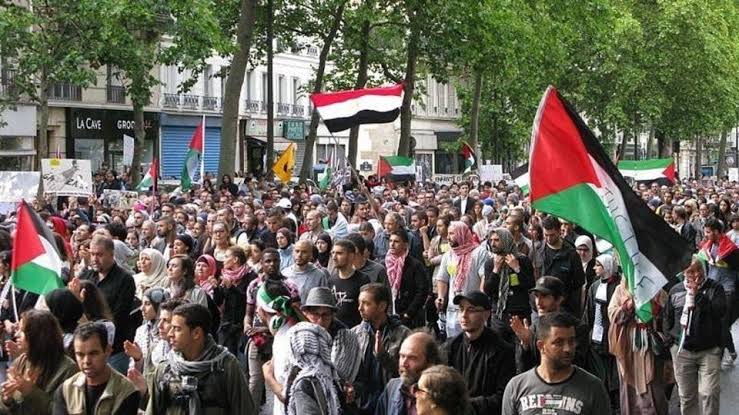Despite a ban, large numbers of people gathered in Paris on Saturday for a pro-Palestinian demonstration.
Police used tear gas and water cannon to try to disperse the first groups of demonstrators, the broadcaster Franceinfo reported on Saturday afternoon.
Around 4,200 police officers were deployed in the French capital, according to the report.
By 7.00 p.m. (1700 GMT), 44 people had been arrested there, according to the Police, and one policeman was injured.
People demonstrated in the capital to mark Nakba Day, especially in Paris’ 18th district, where the Police had previously ordered shopkeepers to close their businesses.
According to the Ministry of the Interior, between 2,500 and 3,500 people took to the streets in Paris, French media reported.

According to official figures, around 22,000 people demonstrated throughout France.
There were also demonstrations in cities like Bordeaux, Lille, Lyon and Strasbourg.
Nakba Day, referring to the Palestinian “catastrophe” marks the mass displacement of hundreds of thousands of Palestinians after the founding of the state of Israel in 1948.
The Paris police prefecture had previously banned the demonstration on the orders of Interior Minister, Gerald Darmanin.
A court confirmed the decision.
It justified the ban on the grounds that public order had been massively disrupted in 2014.
Thousands of people demonstrated seven years ago against the Israeli military offensive in the Gaza Strip at the time.
Rioters also attacked a synagogue and Jewish shops.
The organisers stuck to their call for a demonstration despite the ban.
The Police, therefore, assumed that there could be riots – especially as the current tensions in Israel and the Palestinians could draw large crowds to the rally.
The Paris area Palestinian Association had sharply criticised the ban on the demonstration.
“We have no interest in being violent’’, Pauline Salingue of the New Anticapitalist Party, which supports the demonstration, told Franceinfo radio.
“We will participate in demonstrations in solidarity with Palestine, whether they are authorised or banned.’’
(dpa/NAN)